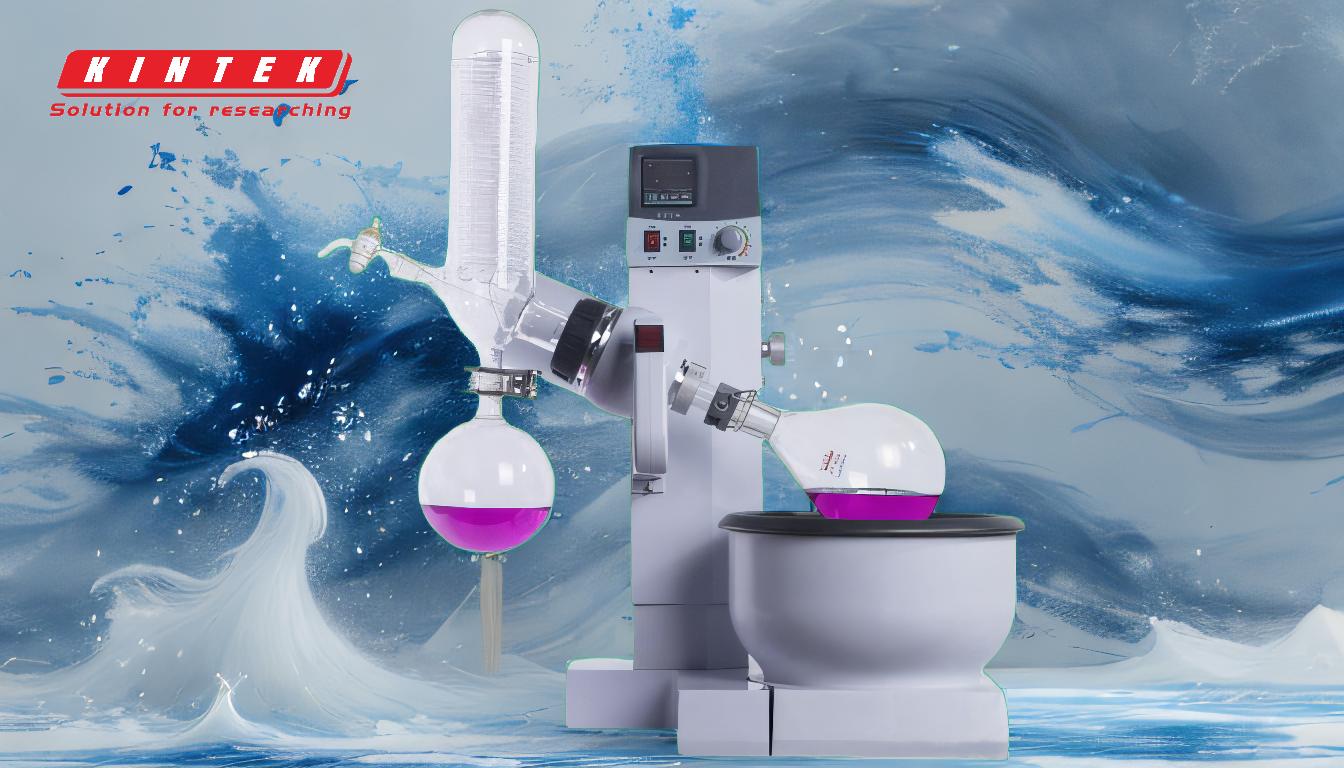Rotary evaporation, performed using a rotary evaporator (rotavap), is a widely used technique in chemical laboratories for the efficient and gentle removal of solvents from samples. Its primary purpose is to separate solvents from mixtures, particularly low-boiling-point solvents, by combining reduced pressure, controlled heating, and rotation of the sample flask. This method is faster and more efficient than traditional evaporation techniques, as it prevents unwanted side reactions like oxidation or decomposition by operating at lower temperatures. Rotary evaporation is essential for isolating desired compounds after processes such as chromatography or extraction, and it is also used in molecular cooking for preparing extracts and distillates. Its versatility, speed, and ability to handle a wide range of solvents make it a cornerstone of laboratory workflows.
Key Points Explained:

-
Primary Purpose of Rotary Evaporation:
- The main goal of rotary evaporation is to remove solvents from samples, particularly in chemical laboratories. This is achieved through a combination of reduced pressure, controlled heating, and rotation of the sample flask.
- It is especially useful for isolating desired compounds after processes like column chromatography or separatory-funnel extractions.
-
Advantages Over Traditional Evaporation:
- Rotary evaporation is faster and more efficient than evaporating solvents at atmospheric pressure.
- By lowering the pressure, the boiling point of the solvent is reduced, allowing evaporation to occur at lower temperatures. This prevents unwanted side reactions, such as oxidation or decomposition, which can occur at higher temperatures.
-
Handling Low-Boiling-Point Solvents:
- Rotary evaporators are particularly effective for removing solvents with relatively low boiling points, such as ethyl acetate (EtOAc) and n-hexane.
- These solvents can be evaporated quickly and efficiently without requiring excessive heat, making the process safer and more controlled.
-
Challenges with High-Boiling-Point Solvents:
- Solvents with high boiling points, such as water or dimethylformamide (DMF), require a vacuum system capable of achieving very low pressures.
- In some cases, high-boiling-point solvents like water are removed using drying agents (e.g., magnesium sulphate) before rotary evaporation to make the process more effective.
-
Role in Molecular Cooking:
- Beyond chemical laboratories, rotary evaporators are used in molecular cooking to prepare extracts and distillates.
- This application leverages the gentle and precise nature of rotary evaporation to create concentrated flavors and aromas without damaging sensitive compounds.
-
Mechanism of Rotary Evaporation:
- The process involves three key components:
- Reduced Pressure: Lowers the boiling point of the solvent.
- Rotation: Increases the effective surface area of the sample, enhancing evaporation rates.
- Controlled Heating: Provides the necessary energy for evaporation while maintaining a low temperature to protect the sample.
- The process involves three key components:
-
Versatility and Common Use:
- Rotary evaporators are simple to use and are commonly found in organic laboratories.
- They are versatile tools for a wide range of applications, from chemical synthesis to food science, due to their efficiency and ability to handle various solvents.
-
Preventing Side Reactions:
- By operating at lower temperatures, rotary evaporation minimizes the risk of side reactions, such as oxidation or decomposition, which can compromise the integrity of the sample.
- This makes it an ideal method for working with heat-sensitive compounds.
-
Efficiency and Time-Saving:
- Rotary evaporation is the fastest and most efficient method for removing low-boiling organic solvents from mixtures.
- Its ability to combine reduced pressure, rotation, and heating makes it a time-saving tool in laboratory workflows.
-
Applications Beyond Solvent Removal:
- While its primary function is solvent removal, rotary evaporation is also used for concentrating solutions, purifying compounds, and preparing samples for further analysis.
- Its gentle and precise nature makes it suitable for a wide range of scientific and industrial applications.
In summary, rotary evaporation is a critical technique in laboratories for the efficient and gentle removal of solvents, particularly those with low boiling points. Its ability to operate at reduced pressure and lower temperatures prevents unwanted side reactions, making it ideal for isolating and purifying compounds. Its versatility, speed, and precision have made it an indispensable tool in both chemical research and molecular cooking.
Summary Table:
| Key Aspect | Details |
|---|---|
| Primary Purpose | Removes solvents from samples using reduced pressure, heating, and rotation. |
| Advantages | Faster, more efficient, and prevents oxidation/decomposition at low temps. |
| Handles Low-Boiling Solvents | Ideal for solvents like ethyl acetate and n-hexane. |
| Challenges with High-Boiling Solvents | Requires strong vacuum or pre-drying for solvents like water or DMF. |
| Molecular Cooking | Used to create extracts and distillates with concentrated flavors. |
| Mechanism | Combines reduced pressure, rotation, and controlled heating for efficiency. |
| Versatility | Widely used in organic labs and food science for various applications. |
| Prevents Side Reactions | Operates at low temps to protect heat-sensitive compounds. |
| Efficiency | Saves time and energy in solvent removal and compound isolation. |
| Applications | Solvent removal, concentration, purification, and sample preparation. |
Learn how rotary evaporation can optimize your lab processes—contact our experts today!









